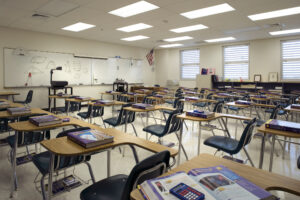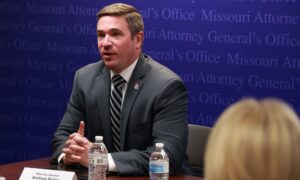14:22
Brief
News Briefs
Missouri teachers want state standardized tests suspended for 2020-21 school year, survey finds
Missouri’s teachers believe state standardized tests shouldn’t be conducted for the 2020-21 school year as they report higher stress levels, with some having considered leaving the profession altogether, a recent survey of Missouri State Teachers Association members found.
The Missouri State Teachers Association, which represents over 47,000 educators throughout the state, surveyed teachers in early December and found nearly 94 percent said statewide assessments should be suspended.
Over 5,700 MSTA members responded to the survey, with about 530 additional responses from nonmembers. A little more than 67 percent said they believed all of their students would not have access to take standardized tests, and roughly 96 percent said their time would be better spent with increased instructional time to teach content with local formative assessments.
Requiring standardized tests this year would be “unethical” Jessica Hodges, a special education teacher in South Kansas City, Missouri, said in the survey.
Mallory McGowin, a spokeswoman for DESE, wrote in an email Tuesday that the department “always values input and feedback from the dedicated educators across our state,” and that more details about the state’s testing plan will be shared at next week’s State Board of Education meeting.
In December, the Missouri State Board of Education voted to still administer state standardized tests for the 2020-21 school year. However, their results will not be factored into state and federal accountability systems. The Missouri Department of Elementary and Secondary Education, or DESE, must receive a waiver to be exempt from federal accountability systems.
The Missouri Assessment Program, or MAP, tests were suspended this past spring, and performance reports were not issued for the 2019-20 school year. The tests measure students’ abilities to master topics outlined in the state’s learning standards and scores are factored into districts’ annual performance reports, which are one of the determining factors that contribute to a school’s accreditation status.
In a letter last month to the State Board of Education, Bruce Moe, MSTA’s executive director, urged DESE to request a federal waiver to suspend all statewide assessments “that will have little to no use for the department, school districts and teachers.”
At last month’s meeting, board members and DESE officials acknowledged the stress teachers and students are under, but also noted the need to measure how students’ learning has been affected by the pandemic that has upended the traditional school year.
About 80 percent of teachers said their stress and anxiety levels had significantly increased compared to this time last year, with about 17 percent reporting a slight increase, according to the survey.
“A standardized test would just add additional pressure and stress and feelings of inadequacy to me and to my students,” Xandra Potter, a North Kansas City teacher in her fifth year, said in the survey.
Teaching this year felt like drinking from a fire hydrant while filling cups of water and distributing them to students all while trying to stay dry, Julie Davis, a teacher in Bolivar, said in response to the survey. Including standardized tests, would be like having to juggle six balls on top of that, Davis said.
Tiffany Bolin in Webb City said it has been like trying to teach all of the same classes three times a day, every single day, as she teaches in-person while also having some students tune in virtually, and then making hard copies of lessons for students who lack internet access.
At last month’s State Board of Education Meeting, the state’s testing plan emphasized tests be administered in-person on campus. DESE was assessing ways to extend the testing window and reduce the time it takes to complete exams by removing questions.
As of Tuesday, roughly 383,550 students were enrolled in schools holding classes onsite or onsite with the option of distanced learning, while about 495,000 students were in a blended model or completely distanced, according to DESE’s dashboard.
“If students aren’t attending school in-person for instruction, why should they come to school for an assessment?” Hodges said.
Citing the fact that many students have returned to some form of onsite learning, McGowin said DESE’s “data does not align with teachers’ concern that students would not be able to access the test.”
The pandemic that has stretched on for ten months has already had a potentially lasting effect. Roughly 57 percent of teachers surveyed said they have considered seriously leaving the teaching profession. Brian Burgoyne, a teacher in Winfield who has been an educator for 19 years, is one of them.
“This has been the absolute worst year of education in my entire life,” Burgoyne said, later adding, “It’s difficult and it hurts, but apparently the community, the administration and the school board don’t care.”
Our stories may be republished online or in print under Creative Commons license CC BY-NC-ND 4.0. We ask that you edit only for style or to shorten, provide proper attribution and link to our website. AP and Getty images may not be republished. Please see our republishing guidelines for use of any other photos and graphics.





